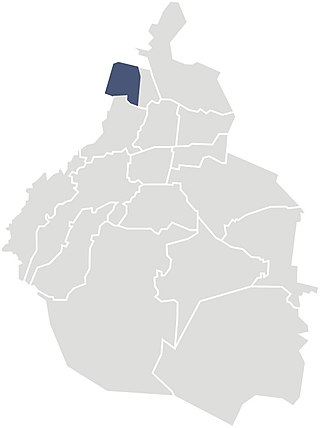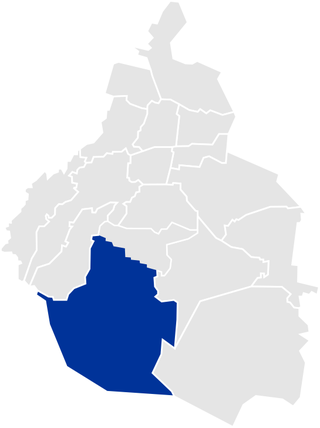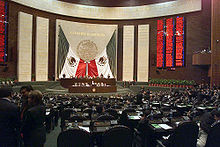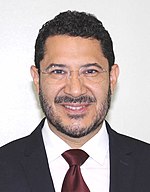
The politics of Mexico function within a framework of a federal presidential representative democratic republic whose government is based on a multi-party congressional system, where the President of Mexico is both head of state and head of government. The federal government represents the United Mexican States and is divided into three branches: executive, legislative and judicial, as established by the Political Constitution of the United Mexican States, published in 1917. The constituent states of the federation must also have a republican form of government based on a congressional system as established by their respective constitutions.

The Congress of the Union, formally known as the General Congress of the United Mexican States, is the legislature of the federal government of Mexico consisting of two chambers: the Senate of the Republic and the Chamber of Deputies. Its 628 members meet in Mexico City.

The Chamber of Deputies is the lower house of the Congress of the Union, the bicameral parliament of Mexico. The other chamber is the Senate. The structure and responsibilities of both chambers of Congress are defined in Articles 50 to 70 of the constitution.

The LX Legislature (60th) of the Congress of Mexico met from September 1, 2006, to September 1, 2009. All members of both the lower and upper houses of Congress were elected in the elections of July 2006.
The LXII Legislature of the Congress of Mexico met from September 1, 2012, to August 31, 2015. All members of both the lower and upper houses of the Congress were elected in the elections of July 2012.
Minerva Hernández Ramos is a Mexican politician affiliated with the National Action Party (PAN) who currently serves in the Chamber of Deputies for the LXIII Legislature of the Mexican Congress. She has also served as a senator and made a bid for Governor of Tlaxcala in 2010.

The Third Federal Electoral District of the Federal District(III Distrito Electoral Federal del Distrito Federal) is one of the 300 Electoral Districts into which Mexico is divided for the purpose of elections to the federal Chamber of Deputies and one of 27 such districts in the Federal District.

The Fourteenth Federal Electoral District of the Federal District(XIV Distrito Electoral Federal del Distrito Federal) is one of the 300 Electoral Districts into which Mexico is divided for the purpose of elections to the federal Chamber of Deputies and one of 27 such districts in the Federal District.
The Seventeenth Federal Electoral District of the Federal District(XVII Distrito Electoral Federal del Distrito Federal) is one of the 300 Electoral Districts into which Mexico is divided for the purpose of elections to the federal Chamber of Deputies and one of 27 such districts in the Federal District.

Emilio Álvarez Icaza Longoria is a Mexican human rights ombudsman and activist serving as a senator in the LXIV Legislature of the Mexican Congress from Mexico City. He previously served as the president of the Inter-American Commission on Human Rights.

Lorena Cuéllar Cisneros is a Mexican politician affiliated with the National Regeneration Movement (MORENA) who serves as the Governor of Tlaxcala. Formerly she served as a member of the Labor Party (PT) as a federal deputy in the LXIV Legislature of the Mexican Congress representing Tlaxcala; she had previously been a senator and mayor of the state capital of Tlaxcala.

Adán Augusto López Hernández is a Mexican politician, lawyer and notary public who served as governor of Tabasco from January 2019 until August 2021, date on which he was appointed Secretary of the Interior by President Andrés Manuel López Obrador. López Hernández is a founding member of the political party MORENA and has formerly held office as senator and congressman in the Tabasco State Congress (2007-2009), the LXI Legislature of the Federal Chamber of Deputies (2009-2012) and the Senate in its LXIV Legislature (2012-2018).
The LXIII Legislature of the Mexican Congress is made up of senators and deputies that are members of their respective chambers. It convened on September 1, 2015 and concluded on August 31, 2018.
The Constituent Assembly of Mexico City is a body formed to create a new constitution for Mexico City in the wake of the 2016 political reforms that convert Mexico City into a federative entity comparable to the 31 states; with "autonomy in all matters concerning its internal regime and its political and administrative organization." It will be installed on September 15, 2016, and must create the new constitution by January 31, 2017.

Ángel García Yáñez is a Mexican politician affiliated to the New Alliance Party. He will serve as a senator in the LXIV Legislature of the Mexican Congress from the state of Morelos. From 2015 to 2018, he represented the Fifth Federal Electoral District of Morelos, centered on Yautepec, in the Chamber of Deputies of the LXIII Legislature of the Mexican Congress.

Legislative elections were held in Mexico on 6 June 2021. Voters elected 500 deputies to sit in the Chamber of Deputies for the 65th Congress.

Delfina Gómez Álvarez is a Mexican politician affiliated with the National Regeneration Movement (MORENA) who is the Governor-elect of the State of Mexico. She previously served as the head of the Secretariat of Public Education appointed by President Andrés Manuel López Obrador. She served as a senator from the State of Mexico in the LXIV Legislature of the Mexican Congress. She also has served as a federal deputy and mayor.

Gubernatorial elections were held in Mexico on June 6, 2021. Governors were to be elected in the states of Baja California, Baja California Sur, Chihuahua, Colima, Guerrero, Michoacán, Nayarit, Nuevo León, Sinaloa, Sonora, Campeche, Querétaro, San Luis Potosí, Tlaxcala, and Zacatecas. The formal period of campaigning is from March 5 to June 2, 2021.

Local elections were held in Mexico on June 6, 2021. Local elections were held for thirty state congresses, 1,900 town halls, Mexico City borough mayors, municipal boards and municipal presidents. Fifteen gubernatorial elections and federal legislative elections will be held the same day.

Local elections were held in Mexico on 5 June 2022. Six states held gubernatorial elections, along with local deputy elections in Quintana Roo and municipal elections in Durango.

































